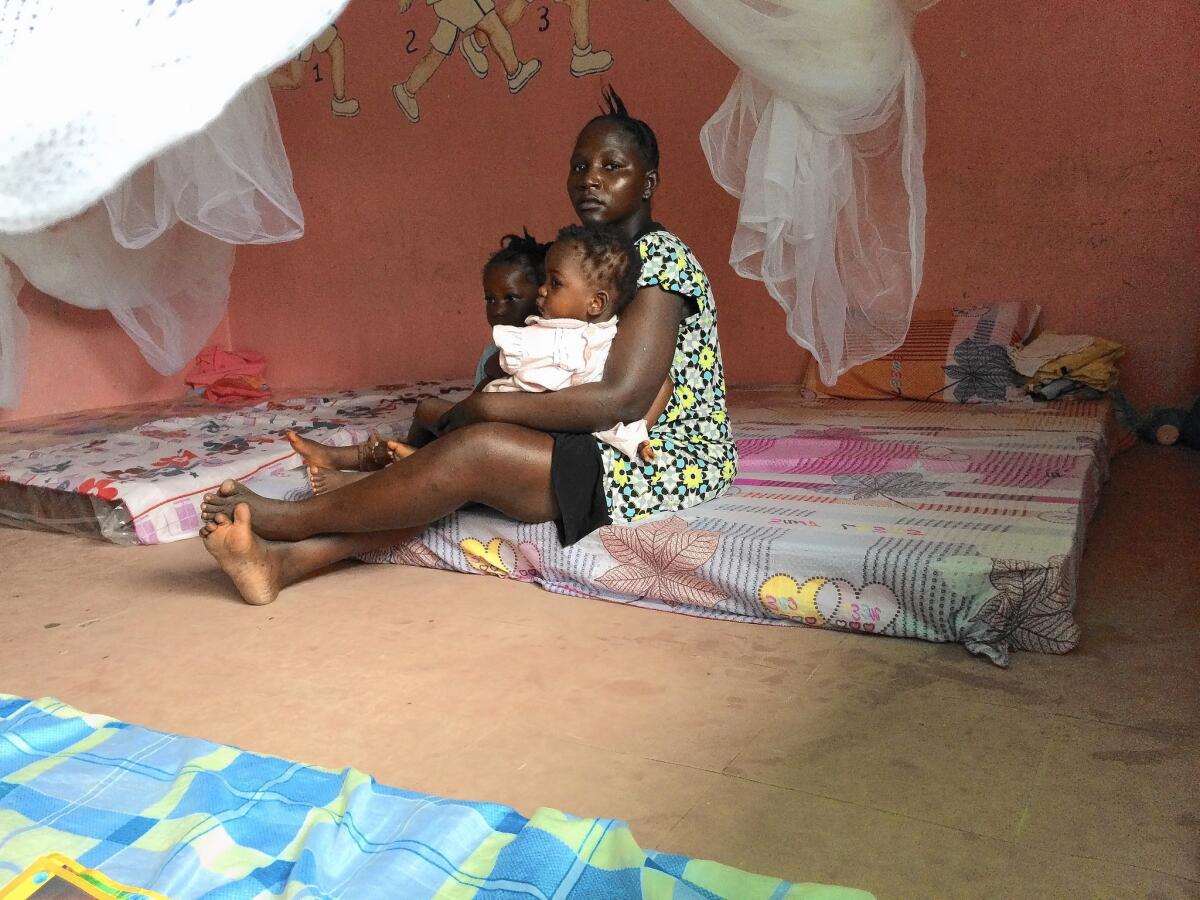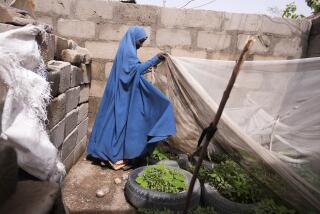Ebola orphans in West Africa struggle to cope with losses

- Share via
Reporting from Unification City, Liberia — Suddenly, Hawa Kaifa has too many responsibilities.
There are Antoinette and Beneta, her two daughters, ages 1 and 3. And there are her two brothers and a nephew.
Kaifa, a shy 21-year-old, has not gotten over missing her mother, a quiet, strong woman who was the rock in her life and supported her and all the children. Her mother dispensed good advice, settled neighborhood disputes and knew how to bring out the best in everyone.
Now Kaifa’s mother is gone, dead of Ebola, leaving an aching grief that never subsides. So is her father, who had separated from her mother, along with Kaifa’s stepfather, brother, sister and uncle. All died over the last two months when the Ebola virus swept through their house in New Georgia, outside Monrovia, Liberia’s capital.
Kaifa barely survived the disease.
None of her relatives seem to want anything to do with her or the children. When she asked an aunt to take in the 10-year-old nephew, the woman said she couldn’t do a thing until “this Ebola business” was over, citing an indefinite quarantine on her town. Kaifa later found out there was no quarantine.
UNICEF estimates that in the three hardest-hit West African countries Ebola has orphaned about 3,700 children, who are shunned by their families and communities after losing their parents and, in some cases, battling the virus themselves.
“As the death toll from Ebola continues to rise, preliminary reports from Guinea, Liberia and Sierra Leone suggest that the number of children orphaned by Ebola has spiked in the past few weeks and is likely to double by mid-October,” Manuel Fontaine, UNICEF director for West and Central Africa, said in a statement Tuesday.
“Ebola is turning a basic human reaction like comforting a sick child into a potential death sentence,” Fontaine said. “The vast majority of the children affected by Ebola are still left without appropriate care.
“Ebola is also exacting a heavy emotional toll on children, especially when they or their parents have to be isolated for treatment.”
Kaifa cannot return to the family’s rented house; the landlord turned her and the children away. A pastor trying to help has been told repeatedly that there’s no room for orphans of Ebola.
When members of her family started dying, other tenants at the home moved out, leaving Kaifa and her brothers and children lying out on the veranda, too sick to help themselves. Only a cook at a cafe came to their aid, approaching the veranda with trepidation and gingerly pushing a plate of food toward them.
Kaifa lay in an Ebola treatment unit for a month, unable to speak or walk. She expected to die. “I said, ‘God, here I am. I’m in your hands.’
“I was on a drip, and I fell down on the ground. They thought I was dead, and they brought a plastic bag to put me inside. Then they turned around and saw I was breathing, and that’s how they put me back on the bed.”
Her mind had wandered feverishly.
“I was thinking, if we go out of here, how will I manage? No father. No mother. Nobody,” she said. “I thought about my own children. I used to worry who would take care of them if I died, because when we got sick, everybody ran away from us.”
Kaifa and the children are now in the Hawa Massaquoi Child Care Center, an orphan transit facility here in Unification City, outside Monrovia. The director, Famata M. Dunoh, is caring for eight children orphaned by Ebola at the center, which is supported by UNICEF.
Dunoh has stopped serving fufu, a Liberian dish made of cassava. The last time she did, an 11-year-old boy from Nimba County named Gondah started sobbing, as soon as he put his spoon into the dish.
“He said he could remember the last thing his mother ate before she died was fufu. From that day I never served fufu, just to stop reminding him of his mother.”
Dunoh has the job of trying to reunite children with families. Some relatives have excuses: They’ll come later, they say, waiting until a time when Ebola has subsided and the fear, hysteria and stigma have faded.
She said the children are emotionally traumatized, grappling with both the loss of their parents and their rejection by the community.
“If you go into the community, no one will let them in their houses,” Dunoh said. “It’s bad, a child will really feel bad if there’s nowhere to go and no one to cherish them.”
“There’s a need for more centers like this, to take people,” she said.
When Kaifa came to the center, with its bright yellow exterior, pink bedrooms and garish murals, she cried for days, grieving for her mother. When Dunoh comforted her and told her not to cry, Kaifa retreated to her room to cry.
Her younger brother is grieving in his own way, behaving badly, rejecting food, making angry demands on his sister and Dunoh.
When he gets that way, Kaifa hunches over, looking anxious, scared and unhappy. She has no idea how she is going to cope with mothering the whole clan, Dunoh said.
Tears brimmed from Kaifa’s eyes as she described her mother.
“My mother would give me good advice. She’d tell me to be a good girl,” Kaifa said. “She was a quiet person. Whenever there was a fight she found a way to resolve it by calling a meeting of the whole area. She didn’t like fighting and confusion.
“She used to pray to God to give her a long life and for her children to be good people tomorrow.”
Kaifa worries about how she and the children will survive. Her only option is trading “small, small things” such as chicken feed and bananas, but it won’t feed five children or pay their school expenses.
Her brow knitted as she thought about how to cope with her troubled brother. “If he misbehaves, there’ll be someone to tell him to behave,” she said, looking uncertain.
Then she remembered there would be no one else to discipline him. She is all he has.
Her face crumpled and tears filled her eyes. She slumped forward, sobbing, her shoulders heaving.
More to Read
Sign up for Essential California
The most important California stories and recommendations in your inbox every morning.
You may occasionally receive promotional content from the Los Angeles Times.










